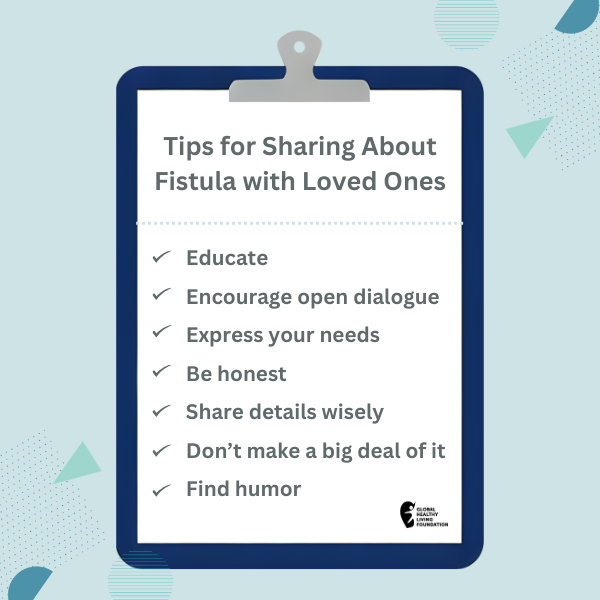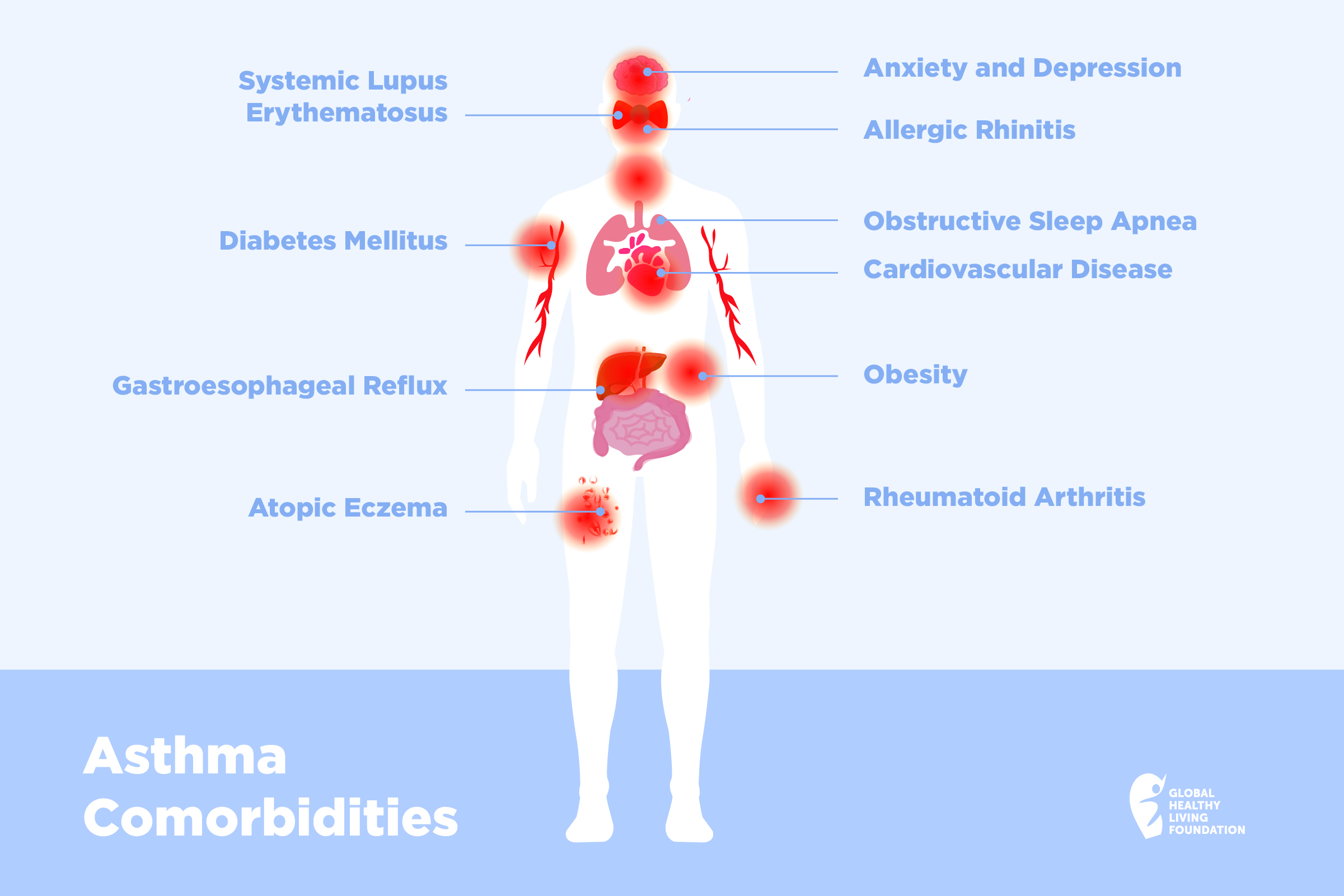Take charge of your asthma and associated conditions. Get tips on teaming up with specialists and confidently advocating for your care.
How to Tell Your Loved Ones About Your Asthma Diagnosis
How to Tell Your Loved Ones About Your Asthma Diagnosis
February 13, 2023
Nina Wasserman

Check out “Our Guide to Personalizing Your Asthma Care” for more information on this topic.
Asthma is a chronic disease that causes the airways in the lungs to become constricted, making it difficult to breathe. About 1 in 13 people suffer from some form of asthma, according to the Asthma and Allergy Foundation of America (AAFA), and the LGBTQ+ community is disproportionately affected. A 2022 study from the Journal of Allergy and Clinical Immunology found that transgender people experience increased rates of asthma.
Although new biologic medications are now available, and they are significantly reducing asthma exacerbation rates, living with asthma isn’t always easy. Luckily, you don’t have to (nor should you) go at it alone. Telling your partner about your asthma is an important step in your disease journey.
Getting the support you need from your partner — especially if you are a member of the LGBTQ+ community — can make all the difference in overcoming health barriers, setting treatment goals, avoiding triggers, and getting proper treatment and care.
Why Talking About Asthma Matters
Here are eight reasons you should tell your partner about your asthma and how they can help share the burden.
Having Your Back
Why tell your partner? Is it necessary? Yes, it is, says Dr. Barbara P Yawn, MD, MSc, FAAFP, Adjunct Professor at the University of Minnesota. “It’s really important to tell your loved ones so they can have your back. People with asthma sometimes have episodes when they feel very panicky.” In a panic, it may be hard to find and use your emergency inhaler.
The first message for your partner, says Dr. Yawn, is “don’t panic.” You need them to stay calm so they can help you. Next, they should know the signs of an attack, where to find the inhaler, and how to use it. They also need to know that if you don’t feel relief after five minutes, you will need to use your inhaler again. In rare situations, you may need them to call 911.
“My partner has been great,” says Carly H., a member of the LGBTQ+ community who has had asthma since birth and who now manages it with medication. “If I’m unable to get my prescriptions, she gets them. She reminds me to take my medicine. She’s a big support system.”
Communication is key, adds Carly. “Be open about your asthma because you never know where your help will come from,” she says. “Your health needs are important so you want to be honest.”
Recognizing Sleep Patterns
Asthma can disrupt sleep. You wake up coughing and you need your emergency inhaler. This can wake up your sleeping partner. But they can help you by recognizing if it’s becoming a pattern.
Frequent sleep disruptions may signal the need to adjust your asthma medications or remove an allergen — like dust or down — from your bedroom. Your partner can help make sure the bedding is fresh and support you in using an allergen-proof mattress and pillow covers.
They also need to know that sleeping in new places with new allergens can be challenging. When you and your partner are aware, it’s easier to assure a good night’s sleep.
Keeping You Calm
Asthma can be anxiety-inducing, says Dr. Yawn. Anxiety is a more common occurrence in people with asthma, according to a 2021 study in Psychological Medical Journal. It’s normal to feel anxious when you can’t breathe. And sometimes the anticipation of having an attack causes worry, which can cause shortness of breath. You may feel like an asthma attack is coming on.
“It can help to talk through these things and have someone to remind you to slow down and take deep breaths,” says Dr. Yawn. If the anxiety is persistent, you may need to talk to a health care professional.
Carly says anxiety is definitely one of her asthma triggers. Her partner helps her through her anxiety. “I grind my teeth or shake my leg when I am anxious. My partner knows it and she will notice and help me calm down,” she explains.
Cleaning Up
For many people, asthma results from allergies. Some of the most common asthma triggers are right in your home and include:
- Dust
- Dust mites
- Mold
- Pests (cockroaches and mice)
The problem is, you should not necessarily be the one who does the cleaning because it can trigger your asthma. If dust sets off your asthma, your home needs to be dusted, swept, and vacuumed daily. Mold in the shower or bathroom can be taken care of with a vinegar solution.
A partner willing to pitch in can make a big difference. Divide your household chores so that your partner can take on the tasks that cause you the most risk.
Take care in using household cleaners as these, too, can be triggers for asthma. The CDC says to avoid using bleach, hydrogen peroxide, and products with fragrances. Ask your partner to use cleaners that are safe for you.
Making the Right Decision About Getting a Pet
If your partner is a pet lover, it may be very difficult to let them know that pets can trigger your asthma. It’s a tricky area of negotiation. Before you bring it up, a simple blood test can let you know if pets are an asthma trigger for you. If they are, you need to be open about it to figure out whether getting a furry friend is a good idea.
But if you already have a pet, or your partner is bringing one into the relationship, together you can help establish boundaries so your pet can remain with you. “Do not sleep with your dog or cat; do not let them in your bedroom during the day,” Dr. Yawn advises. “Keep them off couches. It’s not a perfect solution if you are allergic, but these are things you can do to keep your pets in your home.” The Centers for Disease Control and Prevention suggests using an air cleaner with a HEPA filter.
Getting Support on Pushing Your Limits
With proper management, it’s possible to get your asthma under control. It should not limit you, says Dr. Yawn. “I don’t want people to sit back and say that because they have asthma, they can’t do things. You can get your asthma under control so that it doesn’t limit you.”
Your partner can be the one to encourage you to say no to giving up on the activities you love. They can help you set goals and motivate you to get out there and meet them. “Too many people say they can’t do sports because of their asthma. It’s not acceptable,” says Dr. Yawn.
Being Flexible
When it comes to seasonal allergies, there may be some limitations for people whose asthma is triggered by them. You may have to move your activities indoors. Allergies develop when the body’s immune system overacts to something in the environment. You might experience seasonal allergies at any time during the spring, summer, or fall months.
You and your partner can discuss ways to stay active even if you have to avoid the outdoors at certain times. For example, if you and your partner are used to walking, running, or hiking outside, you may want to switch to a gym during peak allergy season or days with high pollen counts. Or, you might opt to take a walk on the beach to get away from plants and trees that may be triggering your asthma.
Speaking Up
Smoking tobacco is a powerful trigger for asthma, according to the Cleveland Clinic. In fact, exposure to smoke can be even worse for the non-smoker inhaling second-hand smoke.
Smoking damages the cilia, the hair-like structures that move microbes and debris out of your airways. If you have asthma, you need to avoid smoke at all costs. If your partner is a smoker, you will need to explain how smoking is especially harmful for you and the importance of making your home a smoke-free zone.
Your partner can also speak up for you in social situations that become awkward when somebody lights up. “They can be the one to say you have to leave,” suggests Dr. Yawn.
Setting Up An Asthma Action Plan
An Asthma Action Plan is something you can share with your partner so they know when you need intervention during an asthma attack. It is made up of green, yellow, and red zones detailing when to take each of your medications or when you need to seek medical help. The symptoms for each zone are as follows:
- Green: no coughing, chest tightness, wheezing, or shortness of breath
- Yellow: one or more symptoms of coughing, chest tightness, breathing trouble, waking up with asthma
- Red: very short of breath and medications not working
Each plan is made with your doctor to tailor it to your particular needs. The goal is to prevent your asthma from escalating.
Getting Asthma Support
If you would like to receive emails about asthma support and education, please subscribe to the Global Healthy Living Foundation here.
This article was made possible with support from Amgen and AstraZeneca.
Arroyo A, et al. Evaluation of Allergic Diseases in Transgender and Gender-Diverse Patients: A Case Study of Asthma. The Journal of Allergy and Clinical Immunology. January 2022. doi: https://doi.org/10.1016/j.jaip.2021.10.035.
Interview with Dr. Barbara P Yawn, MD, MSc, FAAFP, Adjunct Professor at the University of Minnesota.
Ye G, et al. Anxiety in asthma: a systematic review and meta-analysis. Psychological Medical Journal. January 2021. doi: https://doi.org/10.1017/S0033291720005097.
SUBSCRIBE TO GHLF
RELATED POST AND PAGES
_
Was this article helpful?
YesNo







